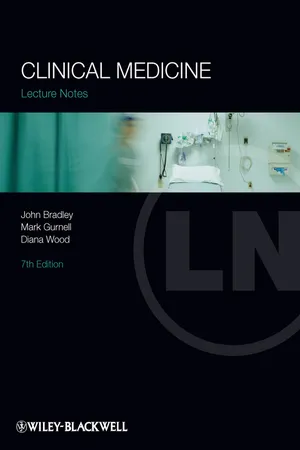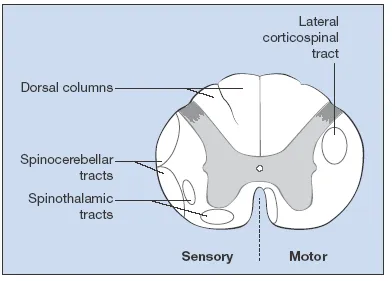
- English
- ePUB (mobile friendly)
- Available on iOS & Android
eBook - ePub
Clinical Medicine
About this book
Clinical Medicine Lecture Notes provides a comprehensive, accessible introduction to the management and treatment of medical conditions. A short manual of techniques on communication and physical examination in Part 1 is supported by the core knowledge required on diseases specific to each body system in Part 2.
Combining readability with high quality illustrations, this seventh edition has been thoroughly revised to reflect up to date practice in examination and clinical investigation, and advances in the evidence base supporting modern day clinical practice. Numerous figures and tables help distil the information for revision purposes, and there are new chapters on the medical interview and assessment.
Whether you need to develop your knowledge for clinical practice, or refresh that knowledge in the run up to examinations, Clinical Medicine Lecture Notes will help foster a systematic approach to the clinical situation for all medical students and hospital doctors.
Frequently asked questions
Yes, you can cancel anytime from the Subscription tab in your account settings on the Perlego website. Your subscription will stay active until the end of your current billing period. Learn how to cancel your subscription.
No, books cannot be downloaded as external files, such as PDFs, for use outside of Perlego. However, you can download books within the Perlego app for offline reading on mobile or tablet. Learn more here.
Perlego offers two plans: Essential and Complete
- Essential is ideal for learners and professionals who enjoy exploring a wide range of subjects. Access the Essential Library with 800,000+ trusted titles and best-sellers across business, personal growth, and the humanities. Includes unlimited reading time and Standard Read Aloud voice.
- Complete: Perfect for advanced learners and researchers needing full, unrestricted access. Unlock 1.4M+ books across hundreds of subjects, including academic and specialized titles. The Complete Plan also includes advanced features like Premium Read Aloud and Research Assistant.
We are an online textbook subscription service, where you can get access to an entire online library for less than the price of a single book per month. With over 1 million books across 1000+ topics, we’ve got you covered! Learn more here.
Look out for the read-aloud symbol on your next book to see if you can listen to it. The read-aloud tool reads text aloud for you, highlighting the text as it is being read. You can pause it, speed it up and slow it down. Learn more here.
Yes! You can use the Perlego app on both iOS or Android devices to read anytime, anywhere — even offline. Perfect for commutes or when you’re on the go.
Please note we cannot support devices running on iOS 13 and Android 7 or earlier. Learn more about using the app.
Please note we cannot support devices running on iOS 13 and Android 7 or earlier. Learn more about using the app.
Yes, you can access Clinical Medicine by John R. Bradley,Mark Gurnell,Diana F. Wood in PDF and/or ePUB format, as well as other popular books in Medicine & Internal Medicine & Diagnosis. We have over one million books available in our catalogue for you to explore.
Information
Part 1
Clinical Examination
Chapter 1
The Medical Interview
Good communication between doctor and patient forms the basis for excellent patient care and the clinical consultation lies at the heart of medical practice. Good communication skills encompass more than the personality traits of individual doctors – they form an essential core competence for medical practitioners. In essence, good communication skills produce more effective consultations and, together with medical knowledge and physical examination skills, lead to better diagnostic reasoning and therapeutic intervention. The term ‘communication skills’, when applied to medical practice, describes a set of specific skills that can be taught, learned and assessed. A large evidence-base shows that health outcomes for patients and both patient and doctor satisfaction within the therapeutic relationship are enhanced by good communication skills.
In this chapter the medical interview as a whole will be considered and then the way in which communication skills should be approached in different types of assessment encountered by students and trainees reviewed.
There are a number of different models for learning communication skills in use throughout the world. They are generally similar and all emphasise the importance of patient-centred interview methods. This chapter is based on the Calgary–Cambridge model (Fig. 1.1) which has been widely adopted in Europe and the USA and with which the authors are familiar as a means of teaching and learning and as a framework for assessment (Silverman et al. 2005). Like all clinical skills, communication skills can only be acquired by experiential learning. This may take the form of small group learning with role play, the use of actors in simulated learning environments or, for more experienced learners, in recorded real consultations with subsequent feedback.
Figure 1.1 The Calgary–Cambridge Guide. From Kurtz, S., et al. (2005) Teaching and Learning Communication Skills in Medicine, 2nd edn. Radcliffe Publishing, Oxford.

Effective Consultation
Effective consultations are patient-centred and efficient, taking place within the time and other practical constraints that exist in everyday medical practice. The use of specific communication skills together with a structured approach to the medical interview can enhance this process. Important communication skills can be considered in three categories: content, process and perceptual skills (see Table 1.1); these mirror the essential knowledge, skills and attitudes required for good medical practice. These skills are closely interrelated so that, for example, effective use of process skills can improve the accuracy of information gathered from the patient, thus enhancing the content skills used subsequently in the consultation.
Table 1.1 Categories of communication skills
| Skill | Examples |
| Content skills | |
| What the doctor communicates | Knowledge-based: appropriate questions and responses; accurate information gathering and explanation to patient; clear discussion of investigation and treatments based on knowledge |
| Process skills | |
| How the doctor communicates | Skills-based: verbal and non-verbal communication skills; relationship building; organising and structuring the interview |
| Perceptual skills | |
| What the doctor is thinking | Attitude-based: clinical reasoning and problem-solving skills; attitudes towards the patient; feelings and thoughts about the patient; awareness of internal biases |
Structure
Providing structure to the consultation is one of the most important features of effective consultation. Process skills should be used to develop a structure that is responsive to the patient and flexible for different consultations. Six groups of skills can be identified and each will be considered below.
Sequential in the consultation:
- initiating the session
- gathering information (including from physical examination)
- explanation and planning
- closing the session
Throughout the consultation:
- organisation...
Table of contents
- Cover
- Title Page
- Copyright
- Preface to the Seventh Edition
- Preface to the First Edition
- Part 1: Clinical Examination
- Part 2: Clinical Medicine
- Color plates
- Index